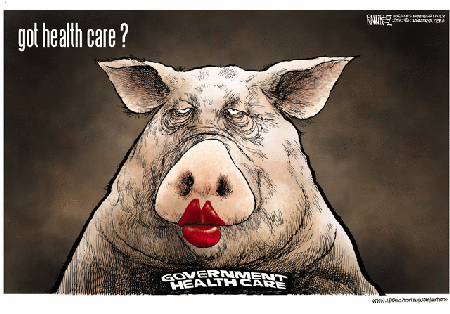by the Night Writer
A new commenter here claimed to be greatly amused by last week’s reprise of the “I don’t want to go on the cart” post I originally did a couple of years ago, where I used the classic Monty Python and the Holy Grail “I’m not dead” scene in juxtaposition with an actual case in Great Britain where an appeals court ruled that British doctors could starve and dehydrate an incapacitated patient to death even if it was expressly against his wishes.
At least, I think the commenter, Rick Claussen, was amused:
Rick Claussen
Aug 10th, 2009 at 12:22 pm
I simply LOVE it that the health care reform fear-mongers are resorting to using Monty-Python sketches to promote their anti-Obama agenda. Keep it coming, I haven’t laughed so hard in days!
Since Rick seemed to have missed a couple of important details in my original post, I helped him out:
The Night Writer
Aug 10th, 2009 at 12:56 pm
Anti-Obama? I know, Rick, that you were laughing so hard that the tears in your eyes made it difficult to see that this post was originally written in 2005 … well before Pres. Obama came to office. This may also have affected your comprehension, since the news story at the heart of the post described an actual case in Great Britain where the appeals courts and the British General Medical Council held that British doctors could withhold food and water from a man losing his ability to communicate, despite his stated wishes that he not be allowed to starve to death.
Or perhaps you just assumed that this story was a myth or an outrageous lie? You see, we don’t have to make up scary scenarios about a proposed, untried healthcare concept; there’s plenty of evidence out there already that government rationing of early-life and end-of-life care is implicit in, and a natural outcome of, socialized medicine.
Well, let’s not let anything like, you know, facts get in the way of a good time:
Rick Claussen
Aug 10th, 2009 at 10:27 pm
You should read David Icke’s books, he and you would likely agree on a great many things.
Referring to something government based as a “natural outcome”, when in fact it would be a “man-made” outcome, is mixing metaphors well past the point of humor or absurdity.
Just because you know how to insert bold type into an article doesn’t make it any more believable that we will soon be living in a “Logan’s Run” society.
Tell the lizards in the parallel dimension of the matrix that I said “Hi!”
Well, obviously, I needed a bigger clue bat.
The Night Writer
Aug 11th, 2009 at 12:09 am
I’ve never heard of David Ickes but I have read Alfred Jay Nock, Adam Smith, George Orwell, Thomas Jefferson and, oh yeah, PJ O’Rourke who wrote, “If you think healthcare is expensive now, just wait until it is free.” Neither the current U.S. model, or the “universal/single-payer/socialized/unicorn-coalition/whatever-it’s-called-this-year” model is economically sustainable. This latest so-called reform does not solve anything, it will only pancake the whole system, including itself.
The core of the issue isn’t really healthcare, or economics, however. They are merely the latest front in the age-old struggle for individual liberty against the just-as-human desire for a few to control the many under the guise of “helping”. Jefferson often noted that liberty decreases as government increases, but I don’t need historical references to great men; simple folk wisdom is sufficient: “He who pays the piper calls the tune.” When the government gets ultimate power to decide who gets what – whether healthcare or food or whatever – it gets the power to decide which individuals or groups will live and which will die. It happens all the time and is still happening all around the world today. You may be comfortable that the present, oh-so-transparent administration would never abuse it’s authority, but what about the next one (or the last one)? Does not the teensiest red flag start to wave somewhere in your mind as you ponder this?
You know, Thomas Jefferson also said, “Errors of opinion may be tolerated where reason is left free to combat it.” The current national debate seems to be focused on rail-roading reason before it can even get out of bed. But for you and me, Rick, let us reason together. I’ve outlined what I believe to be a moral foundation for resisting this power-grab; now you tell me why you think it is such a good idea and why everyone should just fall in line. What are the principles dear to you, the truths you hold to be self-evident, or do you just have a pocketful of snark? If it’s only the latter I fear this conversation will merely be another classic Monty Python sketch: “The Argument Clinic.”
While we wait for Rick to respond I thought I would further illuminate the Jefferson quote — “Errors of opinion may be tolerated where reason is left free to combat it” — in terms of the current healthcare debate. A reasonable thing to do in any argument is to offer a counter-proposal. While I think our present system has distinct flaws, especially in the third-party payer area, there’s no denying the breakthroughs and creativity it has produced saves and improves lives. It even makes it possible to extend lives beyond what is comfortable for the patient, but at least in America it is up to the patient to decide how far to go. Here the patient is put in the position of saying to his or her doctor, “Please, I want to die”, not “Please, I want to live, don’t kill me.” If we leave that kind of decision with the patients, why can’t we also give them the authority to pick and choose their health insurance and healthcare and let the power of the marketplace, rather than the government or third-party payers, manage the cost?
What I’m talking about, of course, is going back (pre-World War 2) to a direct pay model where consumers pay for treatment and health insurance and the providers and insurers compete to win their business (something I’ve been saying for years). After all, in every other area of commerce — houses, cars, groceries, technology, what have you — we expect to shop around and find the value that makes the most sense for us, whether it’s by price, convenience or special features that best suit our needs. Why not with something as important as healthcare? What if employers, instead of paying thousands of dollars per employee for health insurance, gave each employee those thousands of dollars in higher wages and said “buy your own insurance.” Most would likely find their way to a high-deductible, major-medical plan coupled with a tax-deferred Health Savings Account (HSA) to save money for out-of-pocket expenses. If there’s any government layer of coverage at all, let it be only for wellness care such as physicals, health screenings and relatively minor trauma and care that encourages prevention, not for catastrophic care that encourages going without coverage and throwing yourself into the government’s hands in emergencies.
If you have to pay the first couple of thousand dollars yourself out of pocket do you think you might be more inclined to shop around for the best price for, say, cardiology? Do you think doctors and clinics might be anxious to offer pricing and services to attract you? (Especially if a health dose of tort reform is included in the healthcare reform, but that’s for another post). Similarly, if you had the freedom to pick and choose the insurance benefits you wanted, instead of what the government says you need, don’t you think the health insurance companies would compete for your business? Can you imagine watching television and having geckos, animated special agents and Flo saying “pick me!” instead of “take it or leave it”, just as they do in competing for your auto insurance business?
I think that sounds pretty reasonable.













